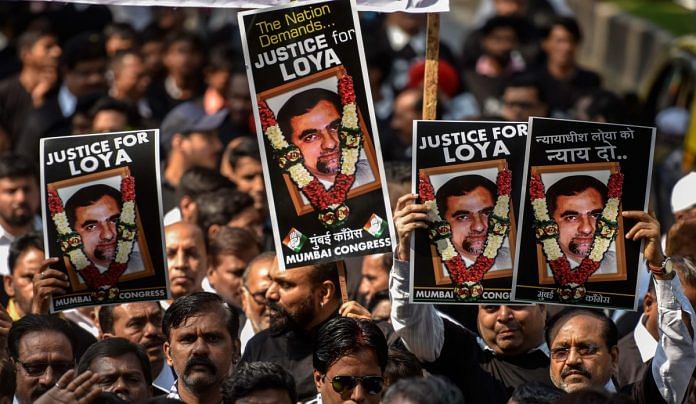Judge Loya died on 1 December 2014 while attending a wedding with fellow judges in Nagpur. At the time, he was the special judge in the trial for the alleged fake encounter of Sohrabuddin Sheikh.
New Delhi: The Supreme Court Thursday declined to institute a fresh probe into the death of special CBI judge B.H. Loya
“We find no reason to doubt the veracity of statements made by judicial officers,” the court said, referring to the judges accompanying Loya at the time of his death.
(Read the full judgment here.)
“We have to lean in favour of judicial officers in larger public interest and to uphold independence of the judiciary,” the court added.
Dismissing the pleas seeking a fresh probe, a bench comprising Chief Justice of India Dipak Misra, justice A.M. Khanwilkar and justice D.Y. Chandrachud questioned the credibility of the petitioners.
“Political scores have to be settled in the great halls of democracy. The petitioners had gone to the extent of insinuating that one man was controlling the entire judiciary,” the court said. “This is an attempt to somehow sensationalise the case, scandalise the court and malign the judges.”
The bench had heard the case for weeks before reserving their verdict on 16 March.
Judge Loya died on 1 December 2014 while attending a wedding with fellow judges in Nagpur. At the time, he was the special judge in the trial for the alleged fake encounter of Sohrabuddin Sheikh, in which BJP president Amit Shah was the prime accused.
After Loya’s death, judge M.B. Gosavi took over the trial. Shah and several other key accused were subsequently discharged.
In November last year, Caravan magazine published a report in which Loya’s relatives were quoted as alleging that Loya was under “immense pressure to give a favourable verdict in the case”, raising questions about the circumstances of his death. News reports subsequently emerged on alleged discrepancies in the probe conducted by Maharashtra police, hinting at a possible cover-up.
Five petitioners, including activist Tehseen Poonawala and journalist Bandhuraj Lone, had moved the Supreme Court seeking a fresh probe. Separately, a request was made to re-examine the witnesses whose statements were taken by police at the time of the judge’s death.
The court agreed to hear the pleas even as the Bombay High Court was already looking into the issue. The proceedings in the high court were then transferred to the top court.
Senior advocates V. Giri, Dushyant Dave, Prashant Bhushan and Indira Jaising appeared for the petitioners while the Maharashtra government was represented by former attorney general Mukul Rohatgi and former solicitor general Harish Salve.
The state government had defended its probe, which established that Loya death was natural, and categorically stated that a fresh probe will “unnecessarily bring the judiciary into disrepute”.
“A fresh probe will look at statements of deceased judge’s colleagues with suspicion and pit one against the other,” Rohatgi had argued.
Every hearing in the case was explosive, with the petitioners and the government hurling accusations at each other. Dave had, on several occasions, said that any unanswered question on Loya’s death would be a blot on India’s independent judiciary.
“If we cannot protect one of our own, we have no reason to exist,” he had told the court.
The Supreme Court has referred the other issues raised by the petitioners, including the transfer of Loya’s predecessor J.T. Utpat, back to the Bombay High Court. Jaising had requested the initiation of contempt proceedings against the administrative committee of the high court that transferred the special judge in the Sohrabuddin Shiekh case in spite of Supreme Court orders against doing so.




Judges cannot lie. Their word must be treated as the gospel truth. Questioning a judge amounts to contempt of court. These are sweeping observations. In a democracy, each custodian of public power can and ought to be questioned, be willing to have her conduct examined. The process of scrutiny and questioning needs to be accompanied by decorum and courtest while dealing with a judge, but it should be penetrating.
We must respect the judgment. It is now the law of the land. However, there was no need to pass strictures or threaten criminal contempt proceedings against the petitioners. They made their case. The apex court, in its wisdom, found it devoid of merit.